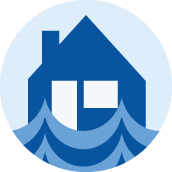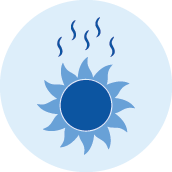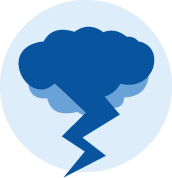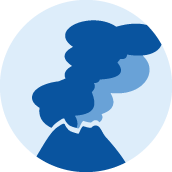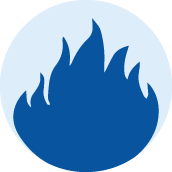What you can do to get ready for volcanic activity
What you will find on here
What is volcanic activity?
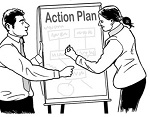
This page is about being ready for if volcanic activity happens.
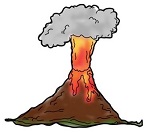
Volcanic activity is what we call things that can happen when a volcano breaks open.
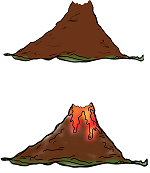
A volcano is a special kind of mountain that has an opening at the top.
When a volcano breaks open a very hot liquid called lava is forced out of the opening.
This is called a volcanic eruption.

Volcanic activity includes things like:
- ash falling from the sky
- rocks falling from the sky
- hot gases coming out of the volcano
- lava coming out of the volcano
- very large mudflows.

Ash is the material that is left when something has been burned.
Volcanic gases are very hot materials that come out of a volcano that often look like steam.
Lava is a very hot liquid that comes out from inside a volcano.
Mudflows are when mud / rock becomes so hot it turns into a liquid like water.

All kinds of volcanic activity are very dangerous.
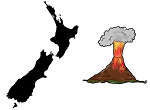
There are many different types of volcanoes around New Zealand.
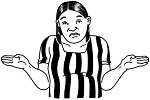
It is not possible to know when volcanic activity might happen.

There are things we can do:
- to be ready if volcanic activity happens
- to protect ourselves
- to protect our family / whānau.
Things you can do to be ready for volcanic activity

The best way to get ready for volcanic activity is to make a plan.

Having a plan will make it easier for you to know what to do if volcanic activity happens.

It is a good idea to find out what the volcanic risk is like where you live.

The volcanic risk is what will tell you how likely it is a volcano will happen.

You can find out what the volcanic risk is for where you live by asking your local council for information.

If your house is in an area that is at risk from volcanoes your local council should tell you about how to evacuate if you need to.

Evacuate means to get to a safe place away from danger.
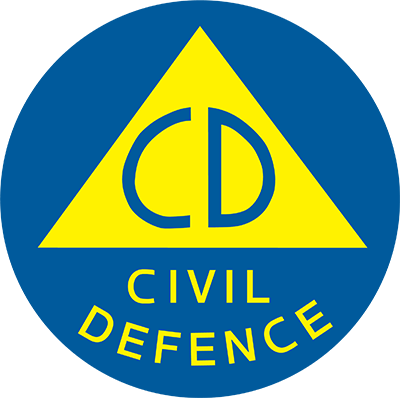
You can also talk to your Civil Defence Emergency Management Group to find out how they will warn you about volcanic activity.

You can find the Civil Defence Emergency Management Group for your local area on the National Emergency Management Agency's website:

Your Civil Defence Emergency Management Group should tell you about:
- how they will let people know about volcanic activity
- how they will evacuate people if volcanic activity happens.
- what you should do with any animals you own if volcanic activity happens.

It is also a good idea to think about what supplies you might need.

Supplies could be things like:
- a stock of bottled water for everyone in your house
- a cupboard stocked with food
- a torch with extra batteries
- a first aid kit.
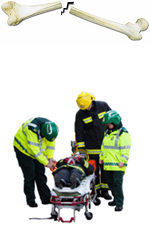
First aid is when you give medical aid to someone who is hurt so you can:
- save the life of that person
- stop their injury from getting worse.
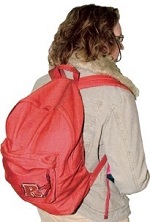
It is also a good idea to put together a grab bag that you can take with you in an emergency.

A grab bag is a small backpack of essential items that you can take with you if you need to get away from danger very quickly.
Who is most at risk of volcanic activity?

Some places in New Zealand are more at risk of volcanic activity.

These places are:
- Auckland
- Bay of Plenty
- Tairāwhiti
- Hawke's Bay
- northern Manawatū
- Northland
- Taranaki
- Waikato.

People who live in areas that are at risk of volcanic activity should make sure they have the following items ready in case of an emergency:
- special dust masks to put over your face that are called P2 rated or N95 rated masks
- goggles to cover your eyes
- plastic wrap / sheeting to keep ash out of electronic items
- thick plastic bags to put the ash in to get rid of it.
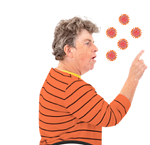
Wearing a P2 / N95 rated mask can stop very tiny particles that can get into your body.

These particles can make you very unwell if they get into your body.

Particles can be things like:
- volcanic ash
- smoke from things that are burning
- other dangerous things in the air.

You should also make sure you have cleaning supplies including:
- an air duster
- a broom
- a shovel
- a vacuum cleaner with spare bags and filters.

It is possible that you could be stuck in your car / other vehicle when volcanic activity happens.
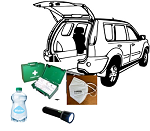
You should make sure you keep some emergency supplies in your car / other vehicle too.
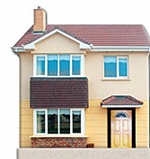
If you have insurance for your home you should make sure it is up to date.

Having insurance is when you pay money to an insurance company so that they will assist you if something goes wrong.
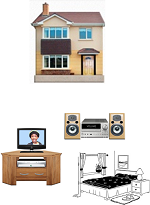
You should make sure you have insurance for:
- your home
- the things you have inside your home known as contents.
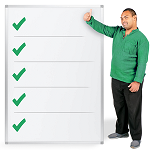
You should make sure your insurance says that you can claim for any damage a volcano does to your home.
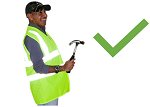
Having insurance will help you get things fixed quicker if your house is damaged by a volcano.
What to do during volcanic activity
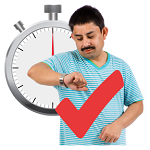
Volcanic activity can happen very quickly.
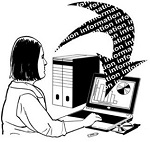
It is important to keep up with any information.

Places you might find information include:
- your local radio station
- groups on the internet such as your local Civil Defence Emergency Management Group.
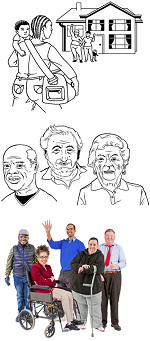
If it is safe to do so you should check on people nearby who might need your help such as:
- your neighbours
- older / disabled whānau
- anyone else who might need your support.

You should make sure you follow any instructions from:
- your Civil Defence Emergency Management Group
- your local council
- emergency services.
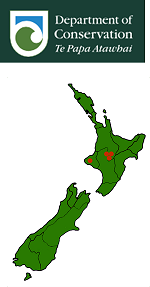
You might also get information from the Department of Conservation if you live in one of these areas:
- Tongariro
- Ngauruhoe
- Ruapehu
- Taranaki.
What to do if volcanic ash starts falling

If volcanic ash begins to fall where you are you should follow your emergency plan.

You should have your grab bag ready in case you need to evacuate.

You should listen to the radio so you know what is happening.
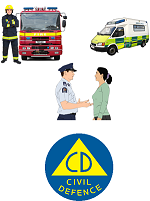
You should follow any instructions from:
- emergency services
- your Civil Defence Emergency Management Group.

It is important to remember that volcanic ash is very dangerous.
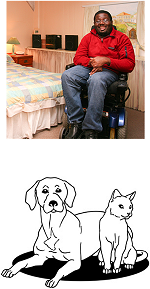
When volcanic ash begins to fall it is important to:
- stay inside
- keep all pets inside.
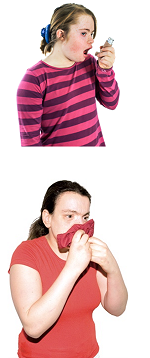
Volcanic ash can make some people very sick like:
- people who have asthma
- people who have other breathing problems like bronchitis.

You should not try to clear ash from the outside of your house while it is still falling.

You should not drive when there is volcanic ash on the road.

You should not go outside until the ash has stopped falling.

If you do have to go outside you should make sure you wear protective clothing like:
- a mask that fits very tightly to your face like a P2 rated or N95 rated mask
- goggles to cover your eyes
- gloves to protect your hands
- sturdy footwear to protect your feet
- clothing that covers your arms and legs.

It is very important to protect yourself from breathing in volcanic ash.
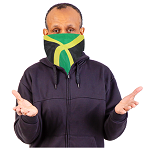
If you do not have a mask you should tie something else over your face like:
- a cloth
- a scarf.

If you wear contact lenses you should:
- take them out
- wear glasses instead.
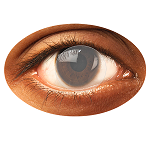
This is because the ash can:
- get trapped in the contact lenses
- scratch / hurt your eyes.
What to do if falling ash is likely to happen
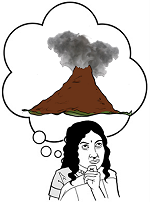
If you know volcanic ash is likely to fall where you are there are some things you should do straight away.

You should go home if you can.

When the ash is falling you should not:
- walk anywhere
- drive anywhere.

If you wear contact lenses you should:
- take them out
- wear glasses instead.

You should bring all pets inside where it is safer.

You should move any livestock like cows and sheep to a safe place inside away from the ash.

Make sure that all animals have access to:
- food
- clean drinking water.
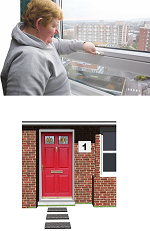
You should make it difficult for ash to get inside your house by:
- closing all windows
- closing all doors
- turning off heat pumps.

You should decide which 1 door people use to get in / out of your house called a single entry point.

You can put damp towels on the floor at the single entry point to stop ash being brought inside.

Volcanic ash can badly damage:
- things that are made of metal
- glass / windscreens
- paintwork
- electronic devices.

You should cover any electronic devices with a plastic sheet to keep them free from ash like:
- televisions
- laptops / computers
- electronic game consoles.

Do not take the coverings away until there is no more ash inside the house.

You should also make sure you cover things like:
- cars / other vehicles
- other machinery like lawnmowers
- spa pools.

Ash that falls into the gutters around your house can also get into drains.
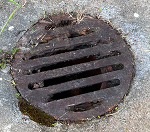
Ash that gets into drains can cause them to clog / not work properly.
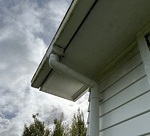
You should disconnect all drainpipes / downspouts from gutters to stop drains from clogging.
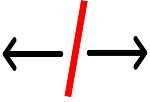
Disconnect means to take away / break something that joins 2 things together.

Falling ash can get into water tanks that collect rainwater.

If you use a rainwater collection system for your water supply you should make sure you disconnect the water tank.

You should check in with other people who may need support such as:
- your neighbours
- older / disabled whānau
- anyone else who might need your support.
What to do after volcanic activity

After any volcanic activity you should make sure you continue to follow instructions from:
- your Civil Defence Emergency Management Group
- your local council
- emergency services.

You might also get instructions from the Department of Conservation if you live in 1 of the areas mentioned in the section Who is most at risk of volcanic activty?

If you have been told to evacuate you must not go back home until you are told it is safe.
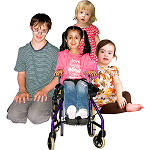
You should make sure children:
- stay inside
- do not play in ash.
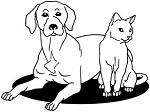
You should keep pets / other animals inside until the ash is cleaned up.

If pets do go outside you should brush them before letting them back inside.
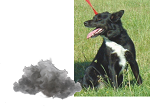
This is to make sure you get rid of any ash that might be trapped on their fur / skin that they could bring inside.

If it is safe to do so you should check on people nearby who might need your support such as:
- your neighbours
- older / disabled whānau
- anyone else who might need your support.
If your property is damaged by volcanic activity

It is possible that volcanic activity could damage your property.

Your property could be things like:
- the outside of your house
- things inside of your house
- your car
- things in your garden like sheds.

If your property is damaged you should not do anything that could:
- be dangerous to you
- cause more damage.

If you have insurance you should tell the insurance company about the damage the volcano has done as soon as possible.

If you rent your home you should tell your landlord about any damage.

You should take photos of any damage caused by a volcano.
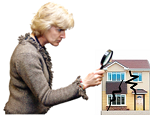
Having photos will mean an insurance company can look at your claim much faster.
Cleaning up volcanic ash
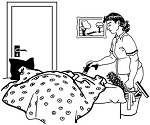
It is important to clean up any volcanic ash as soon as you can.
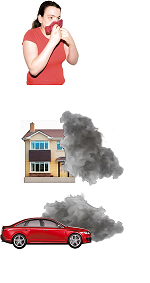
Volcanic ash is dangerous as it can:
- make you very sick
- cause damage to:
- buildings like your house
- machinery like your car.
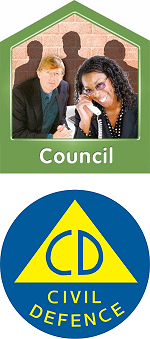
You should follow any cleaning instructions from:
- your local council
- the Civil Defence Emergency Management Group.

It is important to remember that cleaning up ash:
- can be a difficult job
- will take a lot of time
- may need to be done more than 1 time.
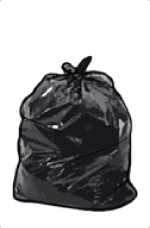
When a lot of ash is put in a bag it is a lot more heavy than it might look like.

There may be limits put on how much water you can use after volcanic activity.
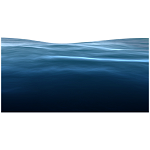
You should as little water as possible so you do not use up supplies of water.

Before you begin cleaning up any ash you should make sure you protect yourself by wearing:
- a mask that fits very tightly to your face like a P2 rated or N95 rated mask
- goggles to cover your eyes
- clothing that covers your arms and legs
- sturdy footwear to protect your feet.

If you wear contact lenses you should:
- take them out
- wear glasses instead.

You should clean up any ash that is inside your house first.

Ash is different from dust you might get in your house as it can scratch / damage things.
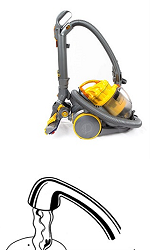
You can make sure you do not scratch things with the ash when you clean them if you:
- use a vacuum cleaner
- rinse things with water.
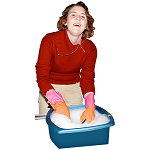
You should use the smallest amount of water as you can.
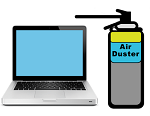
It is best to clean electronic items with a special tool called an air duster so you do not scratch them.

You must wait until the ash has stopped falling before you start to clean up outside.

If it is safe for you to do so you should clean any ash off the roof.

It is important that any roof cleaning is done safely as it can be very dangerous.

You can clean hard surfaces like driveways by:
- adding a small amount of water to make the ash slightly damp
- using a broom to sweep up the ash.
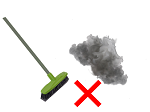
You should not use a dry broom to sweep up as this will move a lot of dangerous ash into the air.
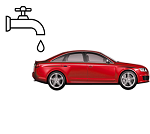
You should clean cars / other vehicles with a small amount of water.

Do not rub / scrub the surfaces when you clean them as this will scratch them.
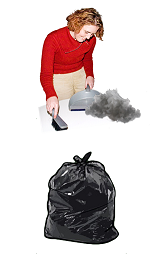
It is important to follow official instructions about:
- cleaning up volcanic ash
- collecting volcanic ash
- storing volcanic ash.

Official instructions about getting rid of volcanic ash might come from:
- your local council
- the Civil Defence Emergency Management Group.

You must not put volcanic ash down drains as it can:
- block them
- be very difficult to get rid of.
What to do in an emergency
There are a lot of hazards in New Zealand. A hazard is something that can cause danger or put people at risk.

